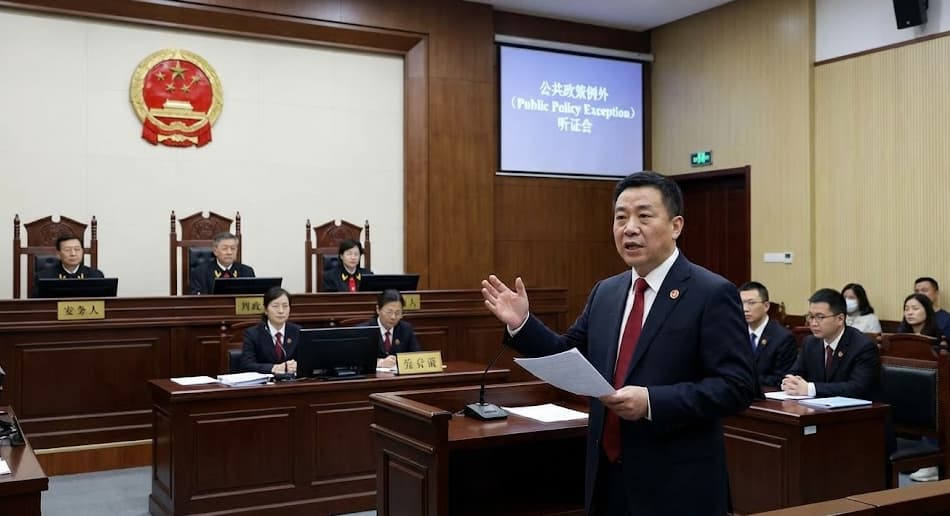China’s National Intelligence Law, passed in 2017, sets out the rules for how intelligence work must be done in the country. It requires Chinese individuals and companies—at home or abroad—to assist with intelligence activities when asked by authorities
The law also lays out how government agencies should organize and carry out these tasks. In short, it builds a system where all parts of society, including businesses, play a role in protecting national security.
This means your information—personal or business—could end up in the hands of the state if you have any connection to China. The law doesn't just apply inside China; it can also reach foreign companies and people tied to Chinese institutions.
It shapes how China strengthens its national security through intelligence gathering and influences global relationships. The effects are far-reaching, sometimes in ways that aren't obvious until you're already involved.
What Is the Chinese National Intelligence Law?

This law lays out broad rules for intelligence work and says individuals and organizations have to cooperate. Chinese authorities get wide powers to gather information tied to national security, both inside and outside China.
Summary of the 2017 Law and Its Purpose
The Chinese National Intelligence Law came into force in 2017 and got an update in 2018. Its main goal? Strengthen China’s security by formalizing how intelligence is collected and managed.
The law sets up a framework for intelligence activities, spelling out roles for state security agencies. It’s meant to protect China’s national security and interests from threats like espionage and sabotage.
National security authorities get unified leadership, and the law outlines how intelligence work is coordinated across different fields. It works alongside the Counterespionage Law, giving China more legal firepower to prevent spying and protect state secrets.
Who the Law Applies To, Inside and Outside China
This law covers all Chinese citizens, organizations, and institutions, no matter where they are in the world. It legally requires you and any Chinese entity abroad to help Chinese intelligence agencies if asked.
If you refuse to cooperate, that’s illegal and could mean criminal charges. The law’s reach goes beyond China’s borders, targeting overseas individuals or groups tied to activities that harm China’s security.
In practice, your company or personal information could be collected if Chinese authorities see it as connected to national security. There’s hardly any line left between domestic and international intelligence efforts.
Data cooperation rules in China’s intelligence framework also shape its AI governance. For the full breakdown, explore China's Artificial Intelligence Law: Everything You Need to Know.
Key Obligations Under the Law

The law spells out clear duties for people and organizations in China. It sets standards for how intelligence work happens and makes sure all parties support national security efforts.
Your responsibilities include complying with state requests and knowing the limits on intelligence activities. This isn't really optional—it's the law.
What Article 7 Really Means for Companies and Citizens
Article 7 says all organizations and citizens have to support, assist, and cooperate with national intelligence work. If intelligence agencies ask for info or help, you must comply—no exceptions.
For companies, that could mean sharing data or letting authorities access your systems and networks. For citizens, it means giving information or assistance if it’s tied to intelligence operations.
The law doesn’t really spell out what agencies can or can’t ask for, so the obligation is pretty broad. You can see how this puts real legal pressure on Chinese entities to take part in intelligence efforts, even if it clashes with other interests.
Mandatory Cooperation With Intelligence Work
The law makes you and your organization actively support intelligence work. That includes providing information, materials, or technical support when national security bodies ask for it.
If you don’t comply, you could face legal trouble. The law covers not just government agencies, but also businesses, social groups, and individuals—so it’s a widespread requirement.
Mandatory cooperation is supposed to make intelligence gathering seamless nationwide. Intelligence agencies can legally demand help beyond classic law enforcement, even getting access to private data or tech resources. Like it or not, you have to respond if they come knocking.
Legal mandates for individual and corporate cooperation aren’t just theoretical—they’ve been reinforced by the updated CEL. Read China's Espionage Law - The Revised. Counter-Espionage Law (CEL) to learn more.
How It Expands State Surveillance

China’s National Intelligence Law gives authorities a lot of power to access data, communications, and tech. It also lets intelligence activities reach beyond China’s borders.
These changes boost the state’s ability to collect info and keep tabs on people both inside and outside the country. You might wonder how far this goes—well, it's pretty far.
Broad Authority Over Data, Tech, and Communications
The law covers a wide range of information, not just state secrets but also “work secrets” and any data tied to national security. Agencies can demand access to electronic communications, databases, and tech resources.
National intelligence agencies can require organizations and people to hand over “intelligence information” without warning. That could mean cybersecurity data, technical details, or even private messages.
The revised law also gives China more tools in counter-espionage and counter-terrorism, including facial recognition and voice monitoring. These tools help track threats but also increase state control over tech and information flow. It’s a double-edged sword, honestly.
Intelligence Collection Beyond China’s Borders
The law doesn’t just stop at China’s borders. Chinese citizens and companies abroad have to cooperate too, so you or your organization could get pulled into intelligence work even outside China.
Espionage now includes things like tech transfers or sharing info—stuff that might seem normal business elsewhere but can be linked to national security risks. The law’s vague definitions make it easier for authorities to call many activities espionage or intelligence threats.
Foreign entities with China ties might face more surveillance or pressure. Chinese intelligence agencies can now operate internationally with more authority, which affects global cybersecurity and diplomatic relations. The risks for people and businesses connected to China just keep growing.
Regulators now require clear labeling and compliance from all AI-generated content platforms. Dive deeper in China Deep Synthesis Regulation 2025: Essential Guide.
Risks for Foreign Companies and Individuals

If you do business in China or with Chinese companies, you’re facing some real risks under this law. These include being legally required to cooperate with Chinese intelligence agencies, and the potential for penalties or data theft.
Knowing how the law impacts your business—and seeing a few real-world examples—can help you prepare. But honestly, it’s a lot to keep up with.
How Foreign Firms Could Be Impacted
You might have to help Chinese intelligence efforts, including giving data or info and cooperating with agency demands. These rules hit not just Chinese companies but also foreign firms and their local employees.
Your everyday business activities could be labeled espionage if they go against Chinese interests—even if they're normal elsewhere. Chinese nationals working for your firm might be forced to help intelligence work, even if it hurts your business.
This law puts your proprietary data, trade secrets, or customer info at risk of being accessed by Chinese authorities. If you don’t comply, you could face penalties or even have your business shut down. On the other hand, complying could compromise your security and business integrity. Not exactly a win-win.
Real-World Concerns: Huawei, TikTok, and More
You’ve probably heard about Huawei and TikTok catching heat worldwide, partly because of concerns about Chinese intelligence laws. Huawei has faced accusations of close government ties, fueling fears it could be forced to share data.
TikTok’s parent company has been investigated in several countries for possible data access by the Chinese government. These examples show how foreign companies with China links can get tangled in legal and political messes.
If you’re doing business with or through Chinese firms, expect more scrutiny. Your data could be at risk, and you might be pushed to comply with demands that clash with your home country’s laws or your company’s policies.
Export inspections are increasingly tied to national security mandates, complicating your supply chain. Unpack the details in China Export Controls: Understanding the Latest Regulations.
Legal Controversy and Global Response
The Chinese National Intelligence Law has triggered big concerns around the world. Many experts see it as a privacy threat, though Beijing has tried to explain what the law does and doesn’t allow.
Why Critics Say the Law Threatens Privacy
Article 7 is the lightning rod here. It requires all Chinese citizens and organizations to “support, assist, and cooperate” with intelligence agencies.
Critics say this creates a legal duty to share information, even if it breaks individual privacy or business confidentiality. This includes Chinese companies both at home and abroad, so foreign data security is a major worry.
Many countries think this allows Chinese intelligence services to run widespread surveillance without oversight. Refusing to comply can mean criminal charges, which has led to bans or restrictions on Chinese firms like Huawei in several places.
Some say the law blurs the line between civilian, corporate, and military information. It’s not hard to see why that’s a red flag for a lot of people.
China’s Defense and Clarification Efforts
China insists the law is defensive, not offensive. Leaders like Xi Jinping and official bodies such as the National People’s Congress say national security is the main goal.
They claim intelligence work must protect China against threats, not authorize pre-emptive spying. The Central Military Commission and Ministry of Public Security have roles that are supposed to be clearly divided from civilian intelligence to prevent abuse.
Chinese officials argue the law is similar to those in other countries and that cooperation is just part of national defense. They also point to confidentiality rules that should prevent misuse of collected info.
Beijing sees international criticism as either misunderstandings or attempts to block China’s growth in global tech and security. Whether you buy that explanation is up to you.
Strong IP safeguards are critical given cross-border intelligence obligations and data disclosures. Learn how lawyers support protection in Intellectual Property Lawyers in China: Guide to Legal Services for IP Protection.
How to Prepare and Stay Compliant
To stay on the right side of China’s National Intelligence Law, you need solid internal controls and a clear grasp of the legal requirements. Focus on who can access what data, keep contracts tight, and don’t be shy about getting legal advice.
Practical Steps: Audits, Access Limits, Contracts
Start with regular audits to know what sensitive info you have under Chinese law. Figure out where your data lives and who has access.
Limit access to only those employees who really need the info. Use strong passwords and keep an eye on network activity—no shortcuts here.
Go through your contracts, especially those with Chinese partners or branches. Put in clauses that spell out your responsibilities under Chinese law and clarify how you’ll handle requests from intelligence agencies.
Keep detailed records of any requests you get from government bodies and how you respond. That kind of paper trail could save you later if things get tricky.
Legal Guidance and Risk Mitigation Tips
Talk to legal experts who know Chinese intelligence and security laws inside out. They can help you make sense of vague terms like “national security” and figure out your real obligations.
Set up a clear policy for responding to government requests. Know when to call your lawyer before you comply.
Keep your employee training fresh so everyone knows what’s expected under the law, especially around confidentiality and cooperation. It’s worth planning for worst-case scenarios, like being forced to share data, by making sure your global data storage and operations are set up to minimize risks and keep your legal defenses strong.
Final Thoughts
The Chinese national intelligence law gives broad powers to China’s government. It makes citizens and companies responsible for helping with intelligence work—even outside China. This creates risks for foreign businesses, especially those handling data or working with Chinese tech.
While China says the law protects national security, many countries worry about surveillance and privacy. If you work with Chinese partners or operate in China, it's smart to know your risks and stay compliant. The best move? Build legal safeguards now.
Want expert help navigating this? Contact China Legal Experts today to protect your business and your data.
Frequently Asked Questions
This section covers common questions about China’s intelligence laws and agencies. You’ll get answers about key articles in the law, China’s main intelligence agency, and new rules about spying and artificial intelligence.
What is Article 14 of the Chinese National Intelligence Law?
Article 14 says Chinese organizations and citizens have to support and cooperate with national intelligence agencies. That means handing over info or help when asked. If you don’t, you could face legal penalties.
What is the AI law in China?
China’s AI law is a set of rules for developing and using artificial intelligence. It aims to ensure safety, ethical use, and national security. At the same time, it tries to promote innovation while keeping oversight in place to prevent risks.
What is China's version of the CIA?
China’s main intelligence agency is called the Ministry of State Security (MSS). It handles civilian intelligence and counterintelligence.
The MSS also manages foreign espionage. While it operates alongside military intelligence, its focus sits squarely on protecting China’s political and economic interests around the world.
What is the new spy law in China?
China’s National Intelligence Law, passed in 2017 and then updated in 2018, is what people call the new spy law. This law requires every Chinese citizen and organization—even those living or working abroad—to help intelligence agencies if asked.
With this, China expanded its authority to gather information and tackle threats. It’s a sweeping move, and honestly, it leaves a lot of folks wondering just how far those powers might reach.
What is the National intelligence Act?
The National Intelligence Act, also known as China’s National Intelligence Law, sets the legal foundation for intelligence work in China.
It spells out which government bodies handle intelligence and what they’re supposed to do.
The main goal? To protect state security by gathering intelligence and running operations within the bounds of the law.
Subscribe to receive updates
Subscribe to receive the latest blog posts to your inbox every week.





